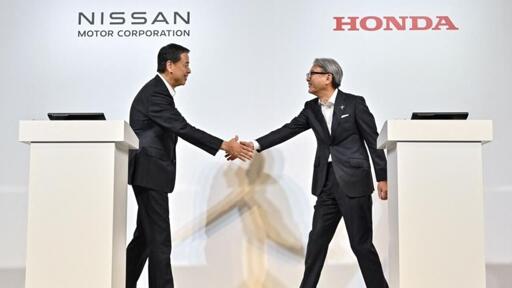Japanese automakers Honda and Nissan have announced plans to join forces and form the world’s third-largest automaker by sales as the industry undergoes dramatic changes in its transition away from fossil fuels.
The two companies said they had signed a memorandum of understanding on Monday and that smaller Nissan alliance member Mitsubishi Motors also had agreed to join the talks on integrating their businesses. “We anticipate that if this integration comes to fruition, we will be able to deliver even greater value to a wider customer base,” Nissan’s CEO Makoto Uchida said in a statement.
Automakers in Japan have lagged behind their big rivals in electric vehicles and are trying to cut costs and make up for lost time.
News of a possible merger surfaced earlier this month, with unconfirmed reports saying that the talks on closer collaboration partly were driven by aspirations of Taiwan iPhone maker Foxconn to tie up with Nissan
A merger could result in a behemoth worth more than $50 billion based on the market capitalization of all three automakers. Together, Honda and the Nissan alliance with Renault SA of France and smaller automaker Mitsubishi Motors Corp. would gain scale to compete with Toyota Motor Corp. and with Germany’s Volkswagen AG. Toyota has technology partnerships with Japan’s Mazda Motor Corp. and Subaru Corp.
Even after a merger Toyota, which rolled out 11.5 million vehicles in 2023, would remain the leading Japanese automaker. If they join, the three smaller companies would make about 8 million vehicles. In 2023, Honda made 4 million and Nissan produced 3.4 million. Mitsubishi Motors made just over 1 million.
The world’s top ten largest carmakers in 2023.
| Rank | Vehicles sold | |
|---|---|---|
| 1 | Toyota (Japan) | 10,307,395 |
| 2 | Volkswagen Group (Germany) | 9,239,575 |
| 3 | Hyundai Motor Group (South Korea) | 7,302,451 |
| 4 | Stellantis (Netherlands) | 6,392,600 |
| 5 | General Motors (United States) | 6,188,476 |
| 6 | SAIC (China) | 5,020,000 |
| 7 | Ford Motor Company (United States) | 4,413,545 |
| 8 | Honda (Japan) | 4,188,039 |
| 9 | Nissan (Japan) | 3,374,271 |
| 10 | Suzuki (Japan) | 3,225,359 |
Nissan, Honda and Mitsubishi announced in August that they would share components for electric vehicles such as batteries and jointly research software for autonomous driving to adapt better to dramatic changes centered around electrification, following a preliminary agreement between Nissan and Honda set in March.
Nissan also boasts years of experience building batteries and electric vehicles, and gas-electric hybird powertrains that could help Honda in developing its own EVs and next generation of hybrids, he said. But the company said in November that it would slash 9,000 jobs, or about 6 percent of its global work force, and reduce its global production capacity by 20 percent after reporting a quarterly loss of 9.3 billion yen ($61 million). It recently reshuffled its management and Makoto Uchida, its chief executive, took a 50 percent pay cut to take responsibility for the financial woes. He said Nissan needed to become more efficient and respond better to market tastes, rising costs and other global changes.
Fitch Ratings recently downgraded Nissan’s credit outlook to “negative,” citing worsening profitability, partly due to price cuts in the North American market. But it noted that it has a strong financial structure and solid cash reserves that amounted to 1.44 trillion yen ($9.4 billion). Nissan’s share price also has fallen to the point where it is considered something of a bargain.
On Monday, its Tokyo-traded shares gained 1.6 percent. They jumped more than 20 percent after news of the possible merger broke last week. Honda’s shares surged 3.8 percent. Honda’s net profit slipped nearly 20 percent in the first half of the April-March fiscal year from a year earlier, as sales suffered in China.



I wonder how much of this is due, or is spurred on, regardless of the publicly stated corporate slop, pressure from their government as they are ramping up military production in hopes of making a Chinese attack cost more than it’s worth.